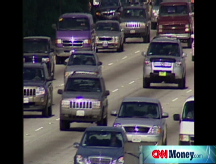Get your hands off my gas...cap
Sales for locking gas caps soar in step with record-high gas prices, suppliers say.
 |
| Sales are soaring for locking gas caps in step with rising gas prices. |
NEW YORK (CNNMoney.com) -- As gas begins to look more like liquid gold, more motorists are keeping it under lock and key, fueling sales for locking gas caps, according to retailers and manufacturers.
Gasoline prices have soared to record-breaking prices for 22 days in a row, reaching a nationwide average of $3.952 for a gallon of regular unleaded on Thursday, according to AAA.
Rising gas prices have been a boon to companies like Stant Manufacturing, Inc., a manufacturer of locking gas caps and supplier to retailers like NAPA, Pep Boys, Carquest and Wal-Mart Stores Inc. Chris Hoffman, marketing specialist for Stant, said his Connersville, Ind.-based company normally sells about one million locking caps a year for $18 to $20 apiece, but sales so far this year have tripled.
The caps use a simple lock-and-key mechanism, and suppliers point out that their sticker price is less than the cost of a tank of gas.
"The last thing you want to do is go out and spend a hundred bucks [on a tank of gas] and then go out and find out you're empty again," said Hoffman, who said NAPA, Pep Boys, AutoZone and Advanced Auto Parts were the leading locking-cap direct-to-customer retailers.
Pep Boys spokeswoman Lauren Johnson said that locking cap sales are up 135% so far this year, compared to the same period in 2007, while sales for non-locking caps are up only 15%.
Smaller distributors in the U.S. and Canada have also seen dramatic increases. "For the most part, [customers] just want to make sure that they're not a victim," said Brent Miller, product specialist and company trainer for AutoSport, in Charlottesville, Va. Miller said his company has sold up to 300 locking caps so far this year, double the typical amount sold during the same time period in prior years.
"The fact that we're seeing increased sales of locking gas caps is indicative that motorists want to hold onto this precious resource until they get to use it themselves," said AAA spokesman Robert Sinclair. "Motorists are being forthright and proactive and trying to prevent something before figures are showing that it's actually happening."
"The police have worse problems than to chase someone who stole $20 or $30 of fuel," said Michael Bouganim, senior vice president and general manager at MotoRad, an auto-parts supplier in Scarborough, Ontario. "I'm sure that people probably don't even report these things."
NYPD spokesman Paul Browne agreed that "a certain amount of crime is almost always certain to go unreported. But we have not experienced a spike in reported gasoline thefts that some might expect following the big price increases at the pump."
Browne said there have been 38 incidents of gasoline theft in New York City so far this year, down from 47 during the same period in 2007. He said the NYPD recently ordered 400 locking gas caps, but that's because the gas caps on hundreds of new cruisers are inoperable. Also, the NYPD prefers the locking caps to prevent tampering, said Browne.
The locking gas stamps will not block a determined thief with a pair of pliers, according to the suppliers. Hoffman said that federal law requires that caps have "breakaway" features, for safety reasons during a serious crash.
"The gas cap is not fool-proof," Bouganim said. "If I want to steal your gas, I can steal it, whether you have a locking gas cap or not."
Like many security features, the caps are designed to discourage less motivated or less experienced thieves, suppliers said, and to deter them from committing crimes in crowded areas because the lock would slow them down.
Dale Fortin, owner and operator of Dearborn Auto Tech in Detroit, said that catalytic converters remain the prime targets for auto thieves, who can get $75 for the platinum. He said he's replaced 20 stolen catalytic converters over the last year.
As for gas, Fortin said he had no faith in a locking gas cap's ability to deter crime. He said that many new cars contain features that prevent siphoning tubes from entering the tank, rendering the locking cap unnecessary. Fortin also said a locked cap won't stand up to a thief who can "twist it right off" with a pair of pliers.
"The locking gas caps don't do any good," he said. "That's why they started this thing about drilling the gas tanks."
In the last six months, Fortin said he has replaced drilled gas tanks on two cars. In both cases, Fortin said that gas thieves drilled right through the tank, an act he described as extremely dangerous.
"One spark can set the thing on fire and then you've got gas pouring out and you could get a fireball," he said. ![]()



